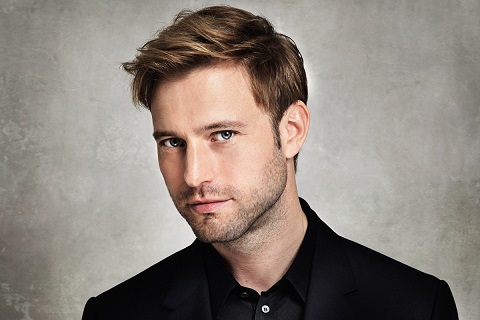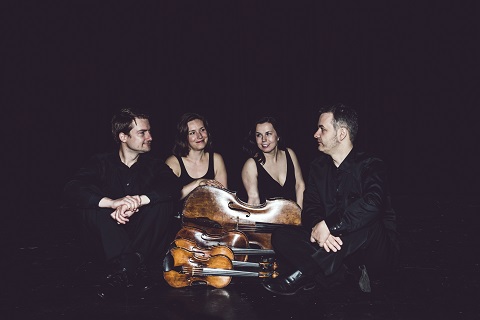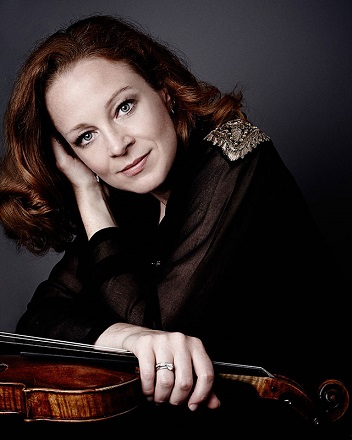
16 Sep 2019
Immortal Beloved: Beethoven Festival at Wigmore Hall
So long as men can breathe or eyes can see,
So long lives this, and this gives life to thee.
English Touring Opera are delighted to announce a season of lyric monodramas to tour nationally from October to December. The season features music for solo singer and piano by Argento, Britten, Tippett and Shostakovich with a bold and inventive approach to making opera during social distancing.
This tenth of ten Live from London concerts was in fact a recorded live performance from California. It was no less enjoyable for that, and it was also uplifting to learn that this wasn’t in fact the ‘last’ LfL event that we will be able to enjoy, courtesy of VOCES8 and their fellow vocal ensembles (more below …).
Ever since Wigmore Hall announced their superb series of autumn concerts, all streamed live and available free of charge, I’d been looking forward to this song recital by Ian Bostridge and Imogen Cooper.
The Sixteen continues its exploration of Henry Purcell’s Welcome Songs for Charles II. As with Robert King’s pioneering Purcell series begun over thirty years ago for Hyperion, Harry Christophers is recording two Welcome Songs per disc.
Although Stile Antico’s programme article for their Live from London recital introduced their selection from the many treasures of the English Renaissance in the context of the theological debates and upheavals of the Tudor and Elizabethan years, their performance was more evocative of private chamber music than of public liturgy.
In February this year, Albanian soprano Ermonela Jaho made a highly lauded debut recital at Wigmore Hall - a concert which both celebrated Opera Rara’s 50th anniversary and honoured the career of the Italian soprano Rosina Storchio (1872-1945), the star of verismo who created the title roles in Leoncavallo’s La bohème and Zazà, Mascagni’s Lodoletta and Puccini’s Madama Butterfly.
Evidently, face masks don’t stifle appreciative “Bravo!”s. And, reducing audience numbers doesn’t lower the volume of such acclamations. For, the audience at Wigmore Hall gave soprano Elizabeth Llewellyn and pianist Simon Lepper a greatly deserved warm reception and hearty response following this lunchtime recital of late-Romantic song.
Collapsology. Or, perhaps we should use the French word ‘Collapsologie’ because this is a transdisciplinary idea pretty much advocated by a series of French theorists - and apparently, mostly French theorists. It in essence focuses on the imminent collapse of modern society and all its layers - a series of escalating crises on a global scale: environmental, economic, geopolitical, governmental; the list is extensive.
For this week’s Live from London vocal recital we moved from the home of VOCES8, St Anne and St Agnes in the City of London, to Kings Place, where The Sixteen - who have been associate artists at the venue for some time - presented a programme of music and words bound together by the theme of ‘reflection’.
'Such is your divine Disposation that both you excellently understand, and royally entertaine the Exercise of Musicke.’
Amongst an avalanche of new Mahler recordings appearing at the moment (Das Lied von der Erde seems to be the most favoured, with three) this 1991 Mahler Second from the 2nd Kassel MahlerFest is one of the more interesting releases.
‘And there was war in heaven: Michael and his angels fought against the dragon; and the dragon fought and his angels, And prevailed not; neither was their place found any more in heaven … that old serpent … Satan, which deceiveth the whole world: he was cast out into the earth, and his angels were cast out with him.’
If there is one myth, it seems believed by some people today, that probably needs shattering it is that post-war recordings or performances of Wagner operas were always of exceptional quality. This 1949 Hamburg Tristan und Isolde is one of those recordings - though quite who is to blame for its many problems takes quite some unearthing.
There was never any doubt that the fifth of the twelve Met Stars Live in Concert broadcasts was going to be a palpably intense and vivid event, as well as a musically stunning and theatrically enervating experience.
‘Love’ was the theme for this Live from London performance by Apollo5. Given the complexity and diversity of that human emotion, and Apollo5’s reputation for versatility and diverse repertoire, ranging from Renaissance choral music to jazz, from contemporary classical works to popular song, it was no surprise that their programme spanned 500 years and several musical styles.
The Academy of St Martin in the Fields have titled their autumn series of eight concerts - which are taking place at 5pm and 7.30pm on two Saturdays each month at their home venue in Trafalgar Square, and being filmed for streaming the following Thursday - ‘re:connect’.
The London Symphony Orchestra opened their Autumn 2020 season with a homage to Oliver Knussen, who died at the age of 66 in July 2018. The programme traced a national musical lineage through the twentieth century, from Britten to Knussen, on to Mark-Anthony Turnage, and entwining the LSO and Rattle too.
With the Live from London digital vocal festival entering the second half of the series, the festival’s host, VOCES8, returned to their home at St Annes and St Agnes in the City of London to present a sequence of ‘Choral Dances’ - vocal music inspired by dance, embracing diverse genres from the Renaissance madrigal to swing jazz.
Just a few unison string wriggles from the opening of Mozart’s overture to Le nozze di Figaro are enough to make any opera-lover perch on the edge of their seat, in excited anticipation of the drama in music to come, so there could be no other curtain-raiser for this Gala Concert at the Royal Opera House, the latest instalment from ‘their House’ to ‘our houses’.
"Before the ending of the day, creator of all things, we pray that, with your accustomed mercy, you may watch over us."

So long as men can breathe or eyes can see,
So long lives this, and this gives life to thee.
In his eighteenth sonnet, Shakespeare celebrates the power of his poetry which, through its own immortality, ensures the posthumous survival of its muse. This concert at Wigmore Hall - the culmination of the Hall’s weekend Beethoven Festival - explored the figure of the ‘immortal beloved’ as it lives on in the work of Beethoven, Mahler, Janáček and Berg.
Immortalising the beloved is indeed one of art’s supreme powers, though it is often the artist’s own emotions that are foregrounded, the loved one - distant or departed - remaining ineffable, tinged with an air of unreality. And, just as Shakespeare’s ‘Fair Youth’ and ‘Dark Lady’ have remained elusive to scholars, so the identity of Beethoven’s ‘Unsterbliche Geliebte’ continues to generate historiographical debate and dispute. Antonie Brentano, Josephine Brunsvik, Almeria Esterhazy, Bettina Brentano: which was the woman to whom Beethoven expressed his apparently unrequited devotion? Or, was that mysterious beloved someone else altogether?
Just as unanswerable is the question, ‘Did the circumstances of Beethoven’s life affect his music, and if so, in what ways?’ Yet, it is this relationship between biography and music that we are invited to consider when we listen to the composer’s 1816 An die ferne Geliebte (To My Distant Love) which sets six poems by Alois Jeitteles, weaving them into a continuous musical narrative - the first ‘song-cycle’ of this kind. And, it was this relationship between art and life which broadcaster and Beethoven biographer John Suchet emphasised in his engaging introduction to the evening’s performances.
Baritone Benjamin Appl immersed himself in Jeitteles’ poems, which present suffering and yearning through natural imagery - the mountains and valleys that separate the poet-speaker from his loved one; the winds, clouds and brooks he envies as they wend their way towards the object of his desire; the nest-making swallows whose peaceful togetherness he covets. As well as effectively drawing out Beethoven’s gentle word-painting, Appl and pianist Kristian Bezuidenhout effectively built the continuous thirteen minutes of music towards the Romantic heights of the final song.
There was nothing melodramatic about Appl’s performance, though; he communicated directly, without undue mannerism, his sweet, walnut baritone infused with a lovely smooth grain. This was an unwaveringly elegant performance, and occasionally I wished for a little more rhythmic ‘drama’. For example, a slight rubato in the penultimate verse of the first song was finely judged, emphasising the poet-speaker’s distress (“Singen will ich, Lieder singen,/ Die dir klagen meine Pein!”), but the subsequent accelerando that Beethoven indicates was rather mild: surely Beethoven, in urgently pushing the music towards Allegro not only evokes but embodies a brief blooming of rapture, as the protagonist sings of song’s own transfiguring powers which “put to flight all space and all time”?
Appl crafted a lovely floating line at the start of ‘Wo die Berge so blau’ (Where the blue mountains), though occasionally the intonation did not feel entirely settled, and the duo negotiated the song’s temporal twists and turns fluently, finding passionate warmth in the closing crescendo . Bezuidenhout’s linking episodes shaped the unfolding moods convincingly. The circling arpeggios at the start of ‘Leichte Segler in den Höhen’, for example, captured the movement of the clouds sailing high above, their lightness suggested too by Appl’s graceful staccatos. ‘Diese Wolken in den Höhen’ (These clouds on high) was bright and buoyant, with deft piano ornaments and a vocal line with a firm rhythmic spring in its step.
Towards the close of ‘Es kehret der Maien’ (May returns), the poet-speaker’s optimism wanes, however, and Appl made effective use of a gentle head voice with the return of the text of the opening, pensively slowing into the final song, ‘Nimm sie hin den, diese Lieder’ (Accept, then, these songs’). Music’s power to transcend time and space is not, after all, eternal. Appl shaped the resigned ending beautifully, diminishing - like the red rays of the evening light which fade behind the mountains - to a wistful pianissimo, and leaving the protagonist’s yearning hanging in the air: “Nur der Sehnsucht sich bewüsst” (… aware only of longing).
 © Škampa Quartet.
© Škampa Quartet.
If the object of Beethoven’s affection remains elusive, then there is no doubting the inspiration of the passion expressed in Janáček’s Second String Quartet, which was given an astonishingly intense, even visceral, presentation by the Škampa Quartet. This was playing of striking vivacity and immediacy: an ‘operatic’ performance which made the elderly composer’s soul-consuming love for Kamila Stösslová powerfully tangible. The cello’s opening trill virtually throbbed and was complemented by the upper strings’ rich, warm tone, establishing the ardency that impelled the music ever onwards. I was struck by the way each voice in the texture had a clearly defined character and strong individual presence, but without any sense of ‘competition’ between the four voices which blended expertly in articulating the Romantic drama.
I don’t think I’ve ever heard the viola theme at the start of the second movement sing so tenderly as it did in Martin Stupka’s rendition or the high first violin line here and in the following movement sail with such a powerful combination of strength and sweetness as did Helena Jiříkovská’s. While the tutti sound was gloriously full it was never overly forceful and there was a lovely transparency to the textures allowing us to appreciate each singing voice. The pulse of the final movement was compelling - a heart beating with strong surges of love - and the Škampa did not push the tempo of this movement too much, allowing space for the contrasts to register and for the trills and decorations to be carefully defined. At the end, there was an overwhelming feeling of hope - an optimism that was absolutely uplifting. A truly wonderful performance.
 Carolin Widmann.
Carolin Widmann.
Carolin Widmann’s performance of Berg’s Violin Concerto, which is dedicated to the memory of Manon Gropius, the daughter of Alma Mahler Werfel and Werther Gropius, was no less absorbing. Widmann’s immensely powerful and focused sound conveyed every ounce of the work’s Romantic lyricism, all the while articulating the structure with assured insight and clarity. Standing at the centre of the O/Modernt Chamber Orchestra, directly facing the audience, Widmann communicated with astonishing poise and probing musicality. Immersed in the musical explorations, at the close of the cadenza she turned almost fiercely towards ensemble leader/director Hugo Ticciati, as if to dare him to join her unfolding arguments. There was gentleness too, though, most especially in the closing Adagio which faded mesmerisingly into silent stillness, preparing us for the final item of the programme, the Adagietto from Mahler’s Fifth Symphony which, led by violinist Priya Mitchell, brought peace and closure to the evening’s Romantic yearnings.
Claire Seymour
Beethoven Festival: Beethoven - An die ferne Geliebte Op.98, Janáček - String Quartet No.2, ‘Intimate Letters’, Berg -Violin Concerto, Mahler - Symphony No.5, Adagietto
Benjamin Appl (baritone), Kristian Bezuidenhout (piano), Škampa Quartet, Carolin Widmann (violin), O/Modernt Chamber Orchestra (director/violin, Hugo Ticciati).
Wigmore Hall, London; Saturday 14th September 2019.